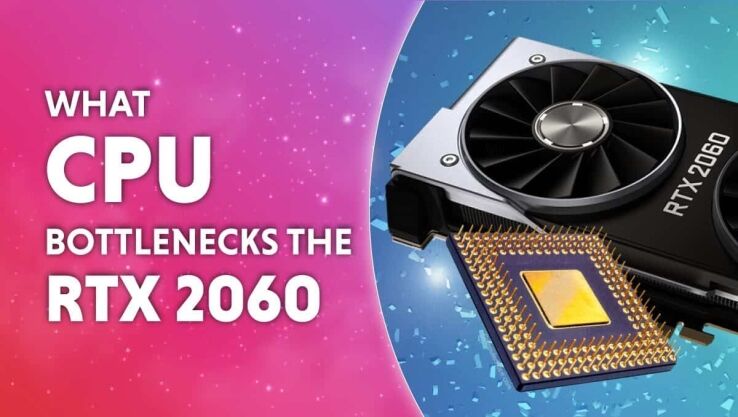What CPU bottlenecks the RTX 2060?
What CPU bottlenecks the RTX 2060? Let's find out

WePC is reader-supported. When you buy through links on our site, we may earn an affiliate commission. Prices subject to change. Learn more
Nvidia introduced to us two revolutionary gaming technologies, Ray Tracing and DLSS, with the release of their RTX 2000 series processors. But what CPU bottlenecks the RTX 2060?
Now Read: Best CPU for RTX 2060
At the lowest end of this range, we find the RTX 2060. A more budget-friendly processor perfect for those who want to experience ray tracing without overspending on the very expensive 3000 and 4000 series GPUs.
While the RTX 2060 is defined as a budget or, at most, a mid-range GPU, it offers us excellent 1080p gaming performance. However, you will have to pair it up with a suitable processor to get the most use out of it.
Going with a processor that’s too weak or too strong would be an inefficient use of your money if you’re looking to build a rig optimized for gaming.
RTX 2060 specifications
Here are the RTX 2060’s specs. It’s built on Nvidia Turing architecture and features a 12nm process.
- Base clock: 1370 MHz
- Boost clock: 1680 MHz
- CUDA Cores: 1920
- Memory clock: 14 GHz
- Memory size: 6GB
- Memory type: GDDR6
- Bus width: 192-bit
- Digital Max Resolution: 7680×4320
- Power usage: 160W
- Recommended PSU: 500W
These specs are about what you’d expect from a ~$200 GPU. 6 Gigs of GGDR6 memory are nice to have but may prove to be insufficient in some of the more graphically demanding titles today.
The GPU also has a very moderate 160-watt TDP, meaning you can power it with a 500-watt PSU (or even lower, depending on your CPU) and create an extremely price-efficient build.
But enough about the 2060’s specs and performance – let’s talk about how it fares when paired up with various processors.
What is a bottleneck?
In a gaming PC, a bottleneck exists when the CPU and the GPU have a sizeable gap in their performance. Your PC is only as fast as the slowest of the two of these chips.
That means you could pair up an RTX 2060 with the fastest supercomputer in the world, but you would only get a framerate as much as the 2060 GPU allows.
The opposite is also true, of course. You could pair up an RTX 2060 with a bare-bones Intel Pentium and Celeron. Even with an RTX 2060, you’d get single-digit framerates due to the processor’s lackluster abilities this time around.
As I’m sure you can tell, bottlenecks are best avoided. And the way to do that is to get a CPU and a GPU that offer similar performance across the board.
What CPU bottlenecks an RTX 2060?
Being an RTX processor does not automatically mean the RTX 2060 is high-end. In fact, the GPU is now probably somewhere in the entry-level to mid-range, if we size it up by modern standards.
Still, you’ll need a capable processor to feed it information fast enough that you don’t end up with a bottleneck.
With an RTX 2060, I recommend you go no lower than a Ryzen 5 5600X or an Intel core i5 10600K processor.
Both of these CPUs have 6 cores, 12 threads, and clock speeds of just under 5 GHz. They are hence very competent gaming processors and will pair beautifully with the RTX 2060 to give you a high-quality 1080p gaming experience.
That’s not all, though. You wouldn’t want to pair the RTX 2060 with a CPU that’s too strong for it, either. I recommend not going above an i5-13400 or a Ryzen 5 5700X with the RTX 2060.
If you do get a faster processor than the 13400, it will remain idle while waiting for your 2060 to catch up, so it would be worth getting a better GPU as well to minimize the bottleneck.